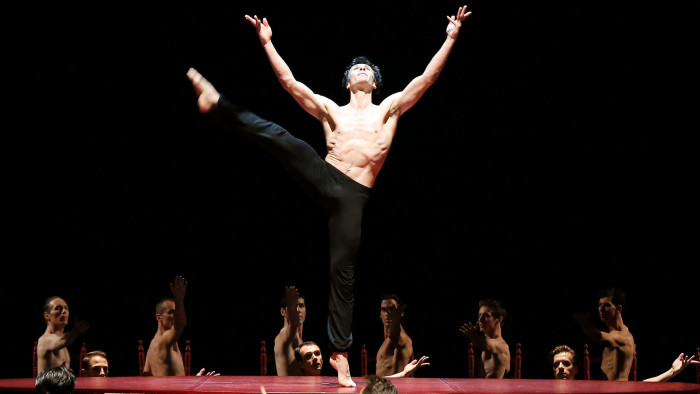Nicolas Le Riche farewell, Palais Garnier, Paris

Simply sign up to the Life & Arts myFT Digest -- delivered directly to your inbox.
The Paris Opera Ballet has seen more than its fair share of confetti this season. The venerable company enforces a mandatory retirement age of 42 and, as a result, three stars have been forced to bow out in a matter of months. The latest to go is no ordinary pensioner: on Wednesday night, the ballet world said goodbye to Nicolas Le Riche, one of the most remarkable figures of his generation.
Instead of the traditional tribute after a regular repertoire evening, Le Riche was allowed a special programme of his own choosing. The resulting gala was beset with problems from the start: next to no tickets were released to the general public, essentially turning it into a private VIP evening, to the fury of fans (as a peace offering, the company subsequently decided to livestream the performance online).
The trend continued on stage with a number of false notes – literally, with a disgraceful showing from the orchestra, and figuratively in an awkward first part composed of highlights from Le Riche’s career performed without him. Interventions from famous friends also proved wince-inducing, with a pompous speech in alexandrines from actor Guillaume Gallienne.
All was well again as soon as Le Riche took to the stage, however. His outstanding technique has barely faded but his greatness also lies in his presence. On stage, he is a man rather than a dancer, charismatic yet warmly natural, piercingly true in every character.
If he was given preferential treatment, it may also be because the narrative of the evening was bigger than a beloved dancer’s goodbye. His is also the last hurrah of the scintillating generation who grew up under Rudolf Nureyev, and subsequently led the Paris Opera Ballet in the 1990s and 2000s. Decline has followed in recent years, and as Benjamin Millepied prepares to take over as artistic director (Le Riche himself missed out on the job), it’s clear the company will never be the same.
That ship has sailed but the repertoire selected by Le Riche was a bittersweet reminder of some of the most glorious evenings of that era. As the curtain rose on the Parisian garret in Roland Petit’s Le Jeune Homme et la Mort, the sight of the still youthful Le Riche slouched on the bed, cigarette in hand, was a poignant memento; the mysterious woman (Eleonora Abbagnato, superb) taunting him to his death could have been time itself.
The evening also heralded the return to the Palais Garnier of Sylvie Guillem, the Nureyev-era star that got away, 10 years after her last appearance. Her partnership with Le Riche was once a staple in London and elsewhere, and in the “Door” pas de deux from Mats Ek’s Appartement, created on Le Riche in 2000, they turned back the clock with disarming simplicity and emotional power.
To close the programme, Le Riche took to the red table of Béjart’s Boléro. In a lovely touch, the corps of men around him was led by étoiles Karl Paquette and Josua Hoffalt, paying their respects to the star who inspired a generation of male dancers. Le Riche himself smiled through the erotic, ritual-like crescendo he has owned for years, his raw presence lifting the slight choreography to new levels of tension.
When the release came, Garnier erupted into a 20-minute standing ovation, roaring and chanting the name of the man who has ruled that stage like no other in recent years. Unlike other stars, Le Riche didn’t seem crushed by the moment; leaping and sliding in the confetti, he looked as if he had no intention of stopping there. Forty-two seems far too young nowadays.

Photograph: Getty
Comments